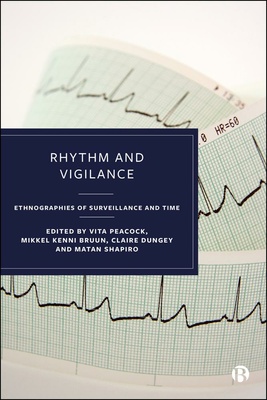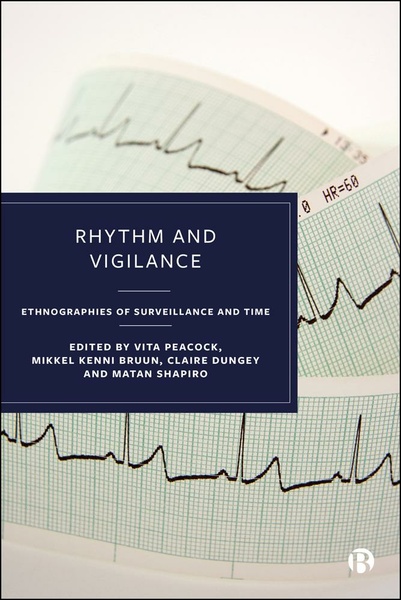Rhythm and Vigilance
Ethnographies of Surveillance and Time
Edited by Vita Peacock, Mikkel Kenni Bruun, Claire Dungey and Matan Shapiro
Published
May 29, 2025Page count
240 pagesISBN
978-1529246520Dimensions
234 x 156 mmImprint
Bristol University PressPublished
May 29, 2025Page count
240 pagesISBN
978-1529246537Dimensions
234 x 156 mmImprint
Bristol University PressPublished
May 29, 2025Page count
240 pagesISBN
978-1529246544Dimensions
234 x 156 mmImprint
Bristol University PressAvailable open access digitally under CC-BY-NC-ND licence.
Studies of surveillance have emphasised how technology is used to control space. This innovative collection examines how new monitoring technologies are also affecting the experience of time.
Drawing on Henri Lefebvre’s concept of rhythm, the book brings together ethnographic research from Europe, China and the US, to show how digital monitoring is transforming spatio-temporal relations across the Global North.
As digital technologies continue to reshape the rhythms of life, this book makes a valuable contribution to both anthropology and surveillance studies.
Vita Peacock is Research Associate at King’s College London and Principal Investigator on the Surveillance and Moral Community project, funded by the European Research Council.
Mikkel Kenni Bruun is Postdoctoral Researcher at King’s College London.
Claire Dungey is Postdoctoral Researcher at King’s College London.
Matan Shapiro is Postdoctoral Researcher at King’s College London.
Acknowledgements
Introduction: Rhythm and Vigilance- Vita Peacock
Part I: Care and Wellbeing
Chapter 1: Watching Our Selves: Fitness and Mindfulness as Practices of Self-Monitoring in Britain - Mikkel Kenni Bruun
Chapter 2: “I don’t have time to watch everybody”: Location-Based Monitoring, Timescapes and Family Life in Germany - Claire Dungey
Chapter 3: Tinkering with Time and Technologies in Dementia Care - Astrid Meyer, Stinne Aaløkke Ballegaard, and Anders Albrechtslund
Part II: Real-Time Monitoring
Chapter 4: Divergent Temporal Dynamics and Time Work Among Delivery Workers in Denmark and Malta - Kalle Kusk
Chapter 5: Uncertain Times: Citizen app and Temporalities of Personalized Security in New York City - Alice McAlpine-Riddell
Chapter 6: Synchronizing Orbits and Deep Learning Algorithms: Satellite Surveillance and Civil Sea Rescue Missions in the Mediterranean - Andreas Stoiber
Chapter 7: Surveillance in Small Acts: Health Code Rituals during the COVID-19 Pandemic in Xiamen, China - Karolina Kupinska
Part III: Systems Past, Present and Future
Chapter 8: Privacy as Unfolding: German Netzpolitik and the Legacy of Colonial Registration - Vita Peacock
Chapter 9: Playtime: Monitoring and Surveillance in NFT Sociality - Matan Shapiro
Chapter 10: Growth’s Imagination: Startups and the Cruel Intimacy of the Internet’s Business Model - Lake Polan
Afterword: Watching, Waiting, Speculating - Sun-ha Hong













